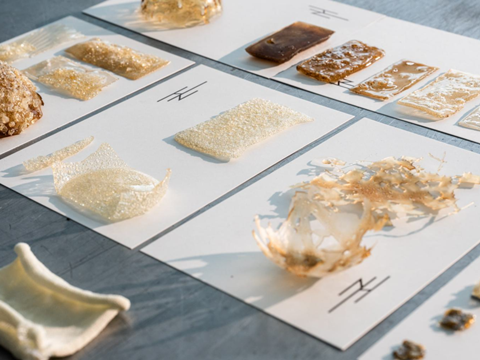
Avantium’s plant-based, recyclable polyethylene furanoate (PEF) polymer – recommended as an alternative material in packaging, bottle, and textile production – has been released under the brand name Releaf.
Releaf is designed to ‘embrac[e] the principles of recycling, renewing and rethinking’, Avantium explains, with its name and leaf logo alluding to the replacement of fossil plastics with plant-based solutions.
The launch of the brand is accompanied by the reveal of the official Releaf website.
“We are incredibly proud to launch the Releaf brand that embodies our commitment to sustainability,” says Jean Lai, marketing and branding manager at Avantium. “Releaf offers a sustainable alternative for bottles, packaging, and textiles.”
Releaf PEF will be displayed at this year’s Dutch Design Week in Eindhoven from 19th – 27th October. In partnership with design studio Hoogvliet Jongerius, Avantium has developed its “From Plants To Plastics” installation, which intends to display the various applications of Releaf, ‘from films and sheets to yarns’.
“We are equally thrilled to collaborate with Studio Hoogvliet Jongerius for this year’s Dutch Design Week,” Lai continued. ”Their creative vision and expertise have allowed us to showcase the beauty and versatility of Releaf, demonstrating that sustainable materials can be both functional and aesthetically stunning.”
“Working with Releaf has been an eye-opening experience,” added Nienke Hoogvliet of Hoogvliet Jongerius. “We’ve been able to push the boundaries of what’s possible with sustainable materials, creating pieces that are not just eco-friendly, but truly beautiful.”
It was announced back in 2020 that Avantium’s wholly-owned subsidiary, Avantium Renewable Polymers, would build a flagship FDCA plant at Chemie Park Delfzijl in the Netherlands; construction was set to be completed in 2023, with commercial production scheduled for the second half of 2024. FDCA is a plant-based ‘building block’ in the production of PEF.
Since this announcement, the Nova Institute has conducted a Life Cycle Assessment with Avantium PEF, concluding that its use in 250ml and 500ml bottles would reduce greenhouse gas emissions by 37% and the resource demand for fossil fuels by 37%.
The company has also supplied a fixed volume of PEF to luxury goods conglomerate LVMH Group for its cosmetics packaging, following successful trials of PEF-based packaging for its Parfums Christian Dior, Givenchy Parfums and Guerlain brands, among others.
Additionally, Refresco has implemented Avantium PEF into Albert Heijn’s fruit juice bottles, reportedly making it the first supermarket chain in the world to adopt the material for own-brand products.
In a conversation with Caroli Buitenhuis of Green Serendipity earlier this year, PEF was raised as an ‘excellent alternative to PET’, said to have ‘much better’ oxygen and water vapour barriers and break down faster than conventional polymers.
If you liked this story, you might also enjoy:
The ultimate guide to the Packaging and Packaging Waste Regulation in 2024
How are the top brands progressing on packaging sustainability?
Sustainable Innovation Report 2024: Current trends and future priorities
Everything you need to know about global plastic sustainability regulation














No comments yet